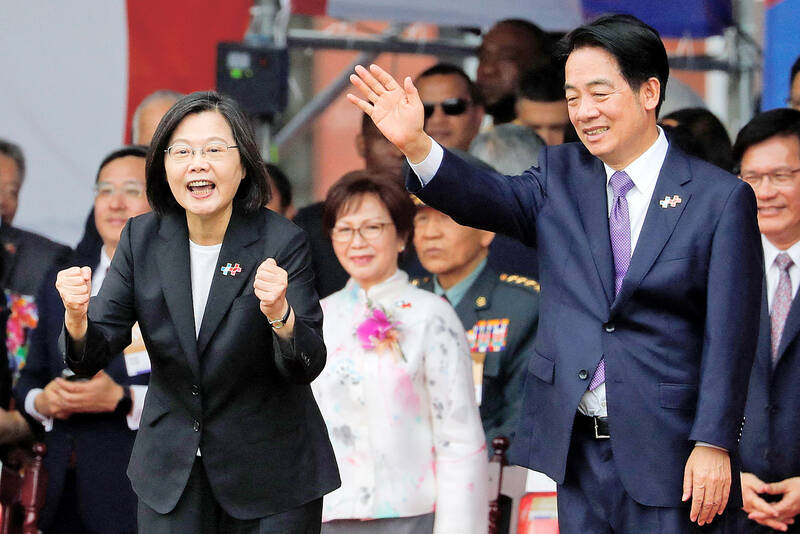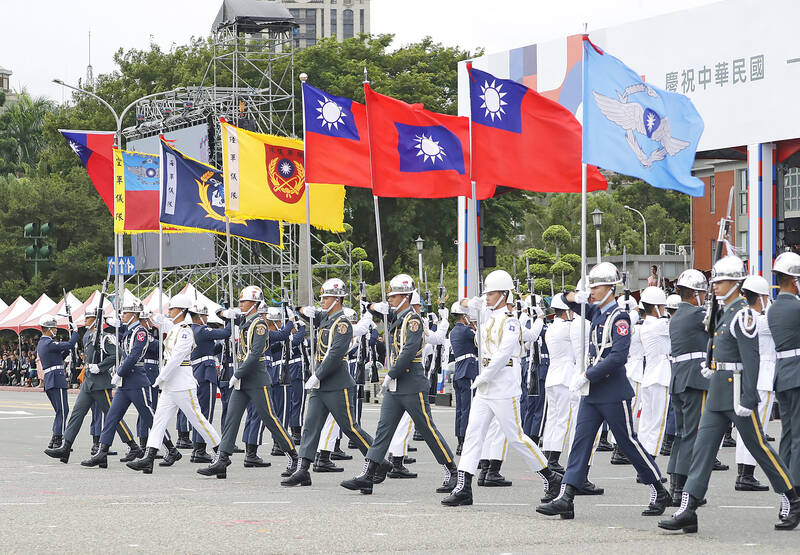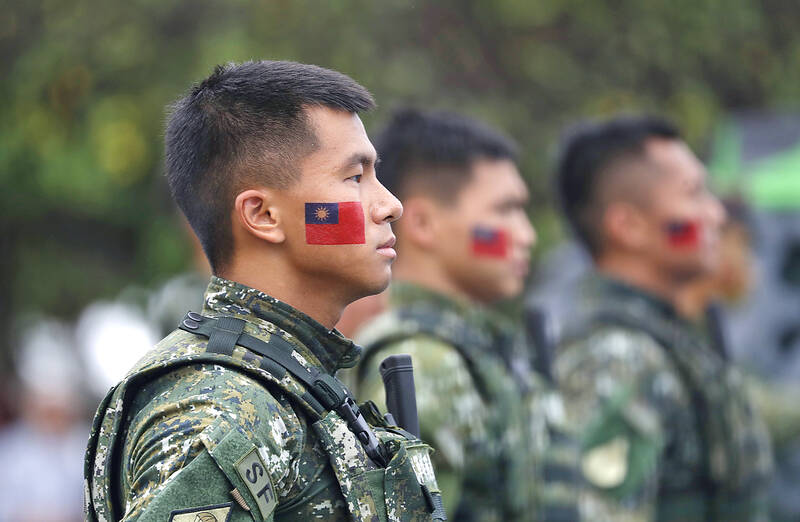President Tsai Ing-wen (蔡英文) yesterday reiterated the importance of maintaining the “status quo” and called on both sides of the Taiwan Strait to seek peaceful coexistence in her Double Ten National Day speech.
Presiding over the National Day celebration as president for the last time, Tsai called for cross-strait peace and reflected on the milestones of the past seven years since she first took office in 2016.
“My administration has kept its promises and maintained the ‘status quo.’ We have adhered to the four commitments. We do not provoke, we do not act rashly and we will absolutely not bow to pressure,” Tsai said.

Photo: Carlos Garcia Rawlins, Reuters
Taiwan, as a force for good in the world, has been working with like-minded partners to safeguard regional peace and stability, as well as providing assistance to nations in need, she said.
Taiwan has proved itself to be a “reliable, effective and safe partner to the world” in geopolitics, democracy and supply chains, which has earned the nation unprecedented international support, she said.
“Since this is a time we can now face the world with confidence and resolve, we can also be calm and self-assured in facing China, creating conditions for peaceful coexistence and future development across the Taiwan Strait,” she said. “Peace is the only option across the Strait.”

Photo: AP
“Peaceful and stable cross-strait relations” should not undermine Taiwan’s sovereignty, democracy and freedom, and should be based on a public consensus and respect for historical facts, she said.
Tsai called on political parties to unite in the face of external challenges after the presidential and legislative elections in January next year.
Seeking a mutually acceptable coexistence with Beijing “is not only the shared responsibility of Taiwan’s political parties, it is also an unavoidable historic responsibility and common mission across the Strait,” she said.

Photo: AP
On domestic issues, Tsai highlighted Taiwan’s first domestically built submarine, the Hai Kun (海鯤號), which was launched last month and is to be in service by 2025.
After 30 years of hard work, “we did it,” she said.
The submarine is a big step forward for Taiwan’s national defense self-sufficiency and asymmetric combat capabilities, Tsai said.
“We once again demonstrated our resolve to defend Taiwan,” she said.
Taiwan has increased its national strength by building an economy that is “highly resilient” and “a key force in the restructuring of global supply chains,” she said.
Not only has the GDP grown considerably, but Taiwan has also strengthened its trade relations with the US, countries included in the New Southbound Policy and Europe in the past seven years, Tsai said.
She thanked Taiwanese for overcoming challenges to legalize same-sex marriage, raise the minimum wage, increase the supply of energy from renewable sources and promote social housing, as well as introducing pension reform and labor finance reform.
As Tsai’s second and final term as president is to end on May 20 next year, she said that she is “infinitely grateful” to Taiwanese for giving her two chances to govern, adding that “our country will continue moving forward.”

AIR SUPPORT: The Ministry of National Defense thanked the US for the delivery, adding that it was an indicator of the White House’s commitment to the Taiwan Relations Act Deputy Minister of National Defense Po Horng-huei (柏鴻輝) and Representative to the US Alexander Yui on Friday attended a delivery ceremony for the first of Taiwan’s long-awaited 66 F-16C/D Block 70 jets at a Lockheed Martin Corp factory in Greenville, South Carolina. “We are so proud to be the global home of the F-16 and to support Taiwan’s air defense capabilities,” US Representative William Timmons wrote on X, alongside a photograph of Taiwanese and US officials at the event. The F-16C/D Block 70 jets Taiwan ordered have the same capabilities as aircraft that had been upgraded to F-16Vs. The batch of Lockheed Martin

US President Donald Trump yesterday announced sweeping "reciprocal tariffs" on US trading partners, including a 32 percent tax on goods from Taiwan that is set to take effect on Wednesday. At a Rose Garden event, Trump declared a 10 percent baseline tax on imports from all countries, with the White House saying it would take effect on Saturday. Countries with larger trade surpluses with the US would face higher duties beginning on Wednesday, including Taiwan (32 percent), China (34 percent), Japan (24 percent), South Korea (25 percent), Vietnam (46 percent) and Thailand (36 percent). Canada and Mexico, the two largest US trading

GRIDLOCK: The National Fire Agency’s Special Search and Rescue team is on standby to travel to the countries to help out with the rescue effort A powerful earthquake rocked Myanmar and neighboring Thailand yesterday, killing at least three people in Bangkok and burying dozens when a high-rise building under construction collapsed. Footage shared on social media from Myanmar’s second-largest city showed widespread destruction, raising fears that many were trapped under the rubble or killed. The magnitude 7.7 earthquake, with an epicenter near Mandalay in Myanmar, struck at midday and was followed by a strong magnitude 6.4 aftershock. The extent of death, injury and destruction — especially in Myanmar, which is embroiled in a civil war and where information is tightly controlled at the best of times —

China's military today said it began joint army, navy and rocket force exercises around Taiwan to "serve as a stern warning and powerful deterrent against Taiwanese independence," calling President William Lai (賴清德) a "parasite." The exercises come after Lai called Beijing a "foreign hostile force" last month. More than 10 Chinese military ships approached close to Taiwan's 24 nautical mile (44.4km) contiguous zone this morning and Taiwan sent its own warships to respond, two senior Taiwanese officials said. Taiwan has not yet detected any live fire by the Chinese military so far, one of the officials said. The drills took place after US Secretary